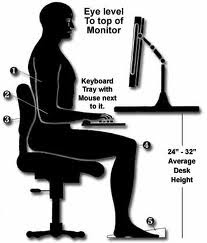Frequently stretch and
walk about: Do not sit the same posture for more than an hour.
Remember to get up and walk about every now and then, to stretch any tired
muscles (hands, shoulders, neck and back included) and to rest the mind
momentarily before diving back into your writing.
Exercise: Take
short walks throughout the day and whenever possible exercise for fitness.
Sedentary lives at computers can lead to health issues you never expected, such
as hormone imbalances (applies to both men and women). Also, long-term disuse
and misuse of muscles and bones can lead to arthritis, muscle degradation and a
loss of density in the bone. Watch out for the last if osteoporosis runs in the family.
Maintain a good
working posture: If the position you’re in is slouched of shoulder or
back you are going to hurt yourself. Remember to keep a curve to your spine,
use your stomach muscles to keep yourself upright and keep your neck and
shoulders straight and not slumped. To help in this, adjust your monitor,
keyboard and mouse so they don’t force you to hunch or lean to reach and see.
Place and adjust the
monitor: The preferred distance between the eye and monitor is 50-100
cm. Adjust your monitor to be directly in front of you, not more than 35
degrees to the left or right. Look at faraway objects every now and then to
relax your eyes. If your eyes dry out or lose the ability to focus you need to look
away and blink to bring moisture to your eyes.
Straight wrist
posture: Watch out for wrist strain from holding your hand at an odd
angle for long periods of time. Flex every now to loosen the muscles and
tendons and keep your wrist as straight as possible throughout your work,
whether typing or using a mouse. To do this you may need to adjust the keyboard
and mouse position.
Desk or surface
position: If the surface you’re working on is too high or too low
it may result in awkward wrist, arm, and shoulder postures, causing muscle
strain. This can be fixed by adjusting the chair height or desk height. Don’t
force yourself to use positions alternate to ones natural to you, such as
left-handers using right-hander equipment or vice versa if that so happens.
Seating: To
help maintain your posture use a chair that supports your back, legs, buttocks
and arms.
Remember to eat: Don’t
skip meals because you’re too busy or engrossed in you’re writing. Your health
depends on how you eat as much as exercise and adequate rest. Making your food from
scratch will give you a much needed break, provide a chance to walk around a
bit, relax your eyes and if you’re doing anything like making bread, use your
arms and shoulders in other ways. Homemade food is often healthier, if you
prepare it with a mind for shorter shelf lives (less sugar or salt, which act
as preservatives).
Remember to drink
water: You may not even feel thirsty because you’re busy at work but your
body might need a drink. Don’t forget to get up and get some water or tea
(green more than black but both are fine). Try not to overdo the caffeine as this can also dehydrate you but if you're like me, drinking plain water over and over again can be incredibly monotonous. I'm not addicted to sugar drinks but I do like a little flavour to my water.
Weight loss or gain: Unintended
weight loss can occur because of the wrong eating habits, an unhealthy
lifestyle or forgetfulness when it comes to eating. Overeating, eating overly sugared or fatty foods and not
moving around enough can result in weight gain. Other factors are hormone
imbalance from a sedentary lifestyle but this will often come along with
chronic fatigue and other symptoms. Anything like this requires a visit to the
doctor, exercise and a change of diet. Don’t self medicate for any reason
unless you really do know what you’re doing. Spending meal times with family or friends will help make
eating an enjoyable break from your writing.
Sleep: Sleep is important
to your health. You'll get headaches and strained muscles from working all
day and night at a computer. Not to mention from thinking so hard on your
writing. Sleep will help you keep a
clear mind while writing, provide new ideas, rest your brain and eyes, increase
your productivity in writing and keep you able to work long term without
sacrificing your health. Just another note on sleep, a lack of sleep can compromise your immune system so all those little bugs your family bring home from the outside world, the one you rarely visit as you're stuck at your computer, will find you a nice little incubator.



No comments:
Post a Comment